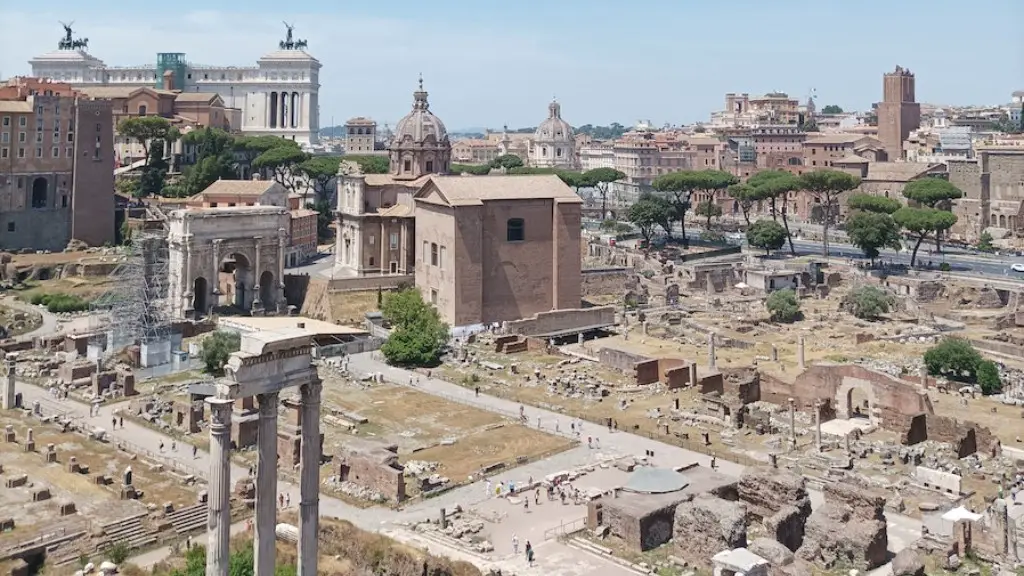The State’s Capture of Runaway Slaves in Ancient Rome
Runaway slaves were a common occurrence in Ancient Rome, used by their owners for various tasks including labor, domestic service, and military service. As such, the Roman state had to develop an effective system for dealing with them. Given Rome’s reliance on slaves, this was a serious problem and one that the state had to address. This article will examine how Roman authorities micromanaged and regulated the capture of runaway slaves and how this helped shape the Roman society.
In Rome, any person seen as a runaway slave was subject to arrest by the state. Roman law granted the praetor urbanus (a type of magistrate) and the quaestor urbanus (another kind of magistrate) the power to apprehend fugitives and impose whatever penalties they deemed fit. This could include fines, or incarceration, or even execution.
The magistrates would send out decurions (administrative officers) to search for fugitives, who in turn employed gladiators and freed slaves to help them in this quest. The decurions also made use of another type of operative called the quaestorius, who was tasked with actively seeking out runaway slaves. They would often collaborate with innkeepers, publicans and tavern-keepers in order to identify runaway slaves and turn them over to the decurions.
These decurions and quaestorians had another, more nefarious tool in their kit: hunting dogs. These were trained to track and capture fleeing fugitives in ways that human beings simply could not. This in particular was a critical measure, as it enabled Roman authorities to catch runaway slaves who managed to escape their pursuers and hide in remote places or difficult terrain.
Catching runaway slaves had not only a practical significance but also an ideological one. It was a way for Roman authorities to publicly demonstrate their power, as those apprehended were usually humiliated and paraded through the streets. This show of force became a form of control, instilling in the populace the sense that no one was above the law, and that the Roman authorities expected their commands to be obeyed.
It is not clear how effective Roman authorities were in their efforts to capture runaway slaves, nor is it known how many fugitives escaped successfully. This is due to a lack of records, as such matters were deemed of lesser concern. Nevertheless, it is clear that Roman authorities were serious about apprehending fugitives and made use of both the law and of trained personnel to ensure that their orders were obeyed.
Recompensing the Abetter
In ancient Rome, when it came to runaway slaves, the authorities began their pursuit and capture with the help of those who had knowledge of their whereabouts. So, they would get rewarded. All over Rome, there were rewards and incentives being given to those who express liking or assistance towards capturing runaway slaves. This incentive was to create a sense of security and as well as to take a further step into eliminating this menace from their society.
One of the most common things would be a specific sum of money for anyone that led to their capture. This would not only reward the abetter with the promised sum but would also put a lot of stress on the runaway slaves from being recognized.
A more expensive reward according to ancient documents were rewards of slaves. It was such a kind of recompense you would get from the state if you had some information about a runaway slave. Many people would take it as a chance to acquire a slave for their own for a low cost, thus feeding the cycle of slavery.
When it came to the capture of escaping slaves, Roman authorities used a variety of methods to ensure a successful capture. Sometimes they used the law to apprehend fugitives, while at other times they used the aid of specialized personnel or hunting dogs. An important aspect of this was that Roman authorities made use of rewards and incentives for those who expressed liking or helped in the capture of runaway slaves. This was meant to create a sense of security and to put pressure on fugitives.
The Effects of the System on Society
The system of rewarding those involved in the capture of runaway slaves had lasting effects on the Roman society. Those who accepted such rewards would do so, knowing they played an active role in repressing the freedom of a fellow human being. This created a cycle of victimhood, where people (or a group of people) could be subject to exploitation and subjugation.
At the same time, those who received these rewards often felt obligated to protect their social standing and those in power. This gave rise to a culture of compliance, where those who accepted such benefits showed willingness to follow the state’s demands and abide by its rules, even if it meant sacrificing the liberty of their fellow citizens.
The cycle of oppression and subjugation was perpetuated, as those who accepted these rewards knew that any mistake or lack of diligence could bring ruin upon them. As such, they continued to remain loyal to the state in the hope that their loyalty would be rewarded. In turn, this helped the state to maintain its control over the population.
Finally, the rewards enabled the Roman authorities to image and portray themselves as just and caring, as those rewards provided some form of compensation for those that helped apprehend fugitives. This further helped them to gain legitimacy as the main authority in charge of managing escaping slaves and other outcasts, and thus ensured their total control over the population.
The Punishments they faced
The punishments Roman authorities imposed on runaway slaves were severe and draconian. The most common punishment was disfigurement, where fugitives were marked with pitch, tar, or tattoos, making them easy to identify if they once again attempted to flee. And if they were caught, they would face severe punishment. Imprisonment was another common fate, with some fugitives being held in special cells for years on end. Some were even executed, as Roman authorities deemed them to be a dangerous element that threatened their rule.
A portion of the above mentioned punishments didn’t just evaluate the fugitive and the crime that was committed, but also the situation at large. This means that if a runaway slave was apprehended far away from where they initially escaped they’d be subject to harsher punishments than if they had been found closer to their point of origin. The same would apply if the process of capture was overly prolonged or intensive. This was part of the Roman authorities, not wanting to encourage fugitive successes in any way, shape or form.
The punishments that was carried out was meant to serve as a deterrent – both to the slave, as well as to all the within their direct reach. Creating a deterrent through punishments is a concept that dates back to the Ancient Roman, and has carried on through the centuries to this day.
The Lasting Impact of the System on Modern Society
The system of penalizing runaway slaves in Ancient Rome served both practical and ideological purposes and pointed to the Roman authorities’ commitment to asserting their power. It also created a culture of compliance and support for the state and sought to ensure total control over the population. This control had other implications too, as the cycle of oppression and subjugation was perpetuated, creating a long-term impact on the Roman society.
Today, modern societies still face the repercussions of this system of slavery and law enforcement in varying degrees. A remnant of this system is to be found in the way modern law enforcement apparatus have treated individuals in the past few decades. Those in power have often used fear tactics and punishments to arrest, detain, and even execute individuals without due process. The idea of capturing runaway slaves in Ancient Rome is still present in modern societies even thousands of years later.
Apart from that, the concept of recompensing those who assist in capturing a fugitive has been absorbed in law enforcement mechanisms too. Even now, some mechanisms allow for rewards for those who cooperate with law enforcement authorities in apprehending criminals. All of this is a lasting legacy ofAncient Rome’s efforts to deal with runaway slaves.
An Overview of the System
In Ancient Rome, runaway slaves were a common occurrence. Roman law granted magistrates the power to apprehend and punish fugitives while they looked for assistance from gladiators, freed slaves, and even hunting dogs. This was supplemented by the use of rewards, a means of incentivizing those who expressed liking or helped in the capture of runaway slaves. Such efforts were meant to ensure that the Roman authorities had total control over the population. They imposed a variety of punishments on fugitives, including disfigurement or even execution. This system still has lasting implications today as modern societies struggle to deal with the legacy of Ancient Rome.





